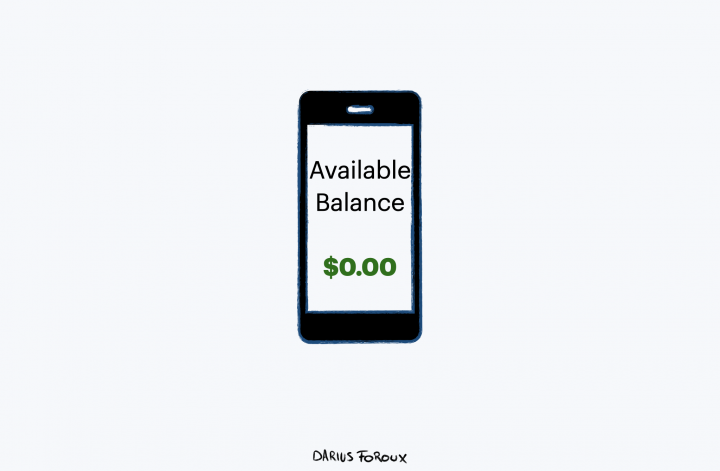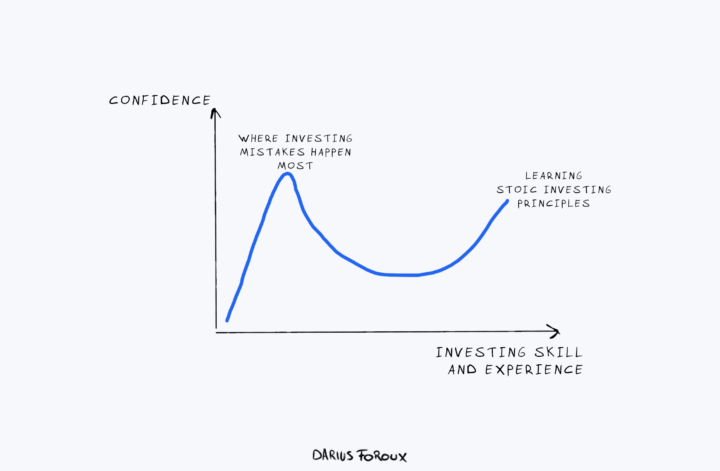When I started investing in 2007, I bought my first stocks without doing much research. In fact, I did more research on buying my first flat-screen TV than which stock to buy.
Over the years, I met a lot of folks like myself. You somehow hear that the richest people in the world are investors 9 out of 10 times, and you think, “I need to get in on that.” You watch CNBC a few days, look at what stocks they talk about, and you end up buying the one you think is a “sure thing.”
“ING bank is a sure thing. There’s no way this stock can go down.”—Darius Foroux in 2007, one year before the financial crisis struck and decimated financial stocks.
When I think about my ignorance, I can’t help but laugh. However, I’m glad I stopped listening to mainstream financial advice. After losing money in the market, I only wanted to learn from great investors who actually made money, and I actively sought them out.
In this article, I’m sharing the 11 most important things I’ve learned from successful stock market investors.1Shoutout to Sam Ro and The Compound who inspired me to write this article.
1. Inflation is good for stocks
Every few years, people worry about inflation, especially now in 2021, and moving into 2022. They see the prices of things they often buy increase, and they get scared. They correctly conclude that their money is becoming worthless.
That’s true—unless you own a business, or if you have ownership in a business.
Think about it. The prices are going up because companies are raising their prices due to shortages and high demand. The consumer doesn’t earn more, but the companies do.
While it’s true that costs will also increase for companies, most can maintain their gross margins, so it doesn’t impact them. Stocks are a great way to hedge against inflation.
2. Stocks have underlying value
The stock market is just like the real estate market. When you buy a house, you own bricks. When you buy stocks, you own a little piece of a much larger business. There’s a logic behind stocks and real estate.
For real estate, the logic is that we only have one planet, and we can’t create more land. When you own a property in a great area in a growing city, the demand will only increase. Especially as the population grows. More people, the same amount of houses, higher prices. Simple, right?
Look at the stock market now. When a company grows, they make more money, which makes them more attractive to own. As a company’s earnings rise, more people want a piece of the action and the stock price increases. That’s how capitalist society works. And as long as we have that, stock prices will increase in the long run.
3. Beating the stock market is not the primary goal
Every stock trader wants only one thing: To beat the market. That’s how people measure themselves in this field. But for a long-term investor who keeps investing more money, market returns are perfectly fine.
Sure, it might be 20% one year, and 3% the other, but at least it’s not 0% every single year when you don’t invest.
Achieving market returns over a decade is better than beating the market two out of ten years.
4. There are ALWAYS massive opportunities
If you hear news about stocks or assets that shot up triple digits in a short amount of time, and your hands are itching from greed, just sit back. You’ve missed that train. Never trade something after it reaches the mainstream because it’s too late. The insiders got all the action.
If you’re really interested in riding a big trend, put in the work. Become an active trader. In the history of the markets, there always have been massive opportunities to generate big returns.
Simply decide to catch the next opportunity early on, or, sit back, invest in an index fund, and enjoy your life. Check back in with your account in ten years.
5. Trends are everything
The stock market can sometimes be like a drowning man you’re trying to bring back to shore. When the man panics, he will take you down. It doesn’t matter how great the economy is doing, if there’s global panic, and the trend is downwards, everything will go down (including gold and bitcoin).
Understanding this will help you in two ways. First, you understand why good stocks are getting punished (it’s just the trend). Second, you’ll keep investing on the way down because, at some point, the market goes up again.
6. No one really knows anything about the future
I really appreciate all the experts on TV, YouTube, social media, and newsletters who are trying to predict the future, but we always have to realize no one exactly knows what will happen in a few weeks, months, or years.
Everyone simply has an opinion. Even if you’re the most famous economist in the world or an investor with the highest returns, you still don’t know what will happen.
While it’s good to be informed, it’s bad to react based on what people think will happen. Otherwise, you’re not an investor, you’re a trader.
Investing for the long term is not about reacting, it’s about sitting. You bet on growth and you wait.
7. Timing the stock market is foolish
It’s certainly possible to time the market. There are many stories of professional traders who’ve done it. You can read about them in Jack Schwager’s Market Wizards book series.
But for long-term investors, it makes no sense to time the market. Peter Lynch is famous for saying, “More people have lost money waiting for corrections and anticipating corrections than in the actual corrections.”
Imagine you want to buy a stock at 50, and you’ve heard on Twitter the market is due for a correction. You wait and rub your hands. “When this thing drops to 40, I’m going all in.”
It goes to 70 over the next two months, and then, just like the geniuses predicted, the market corrects. But your stock drops to 60. Congrats, you missed out on 20% returns. Don’t time the market unless you know what you’re doing. The same is true for investing in the S&P500. It doesn’t make sense to wait for a correction.
8. Stocks always revert to the mean
In the short-term, stock prices behave irrationally. In the long term, they are surprisingly rational. If you worry about high valuations, and you want to avoid investing, remind yourself that things will even out in time. Keep investing and play the long game.
There are always winners, and there are also a lot of losers. Just because stocks move up in the long run, it doesn’t mean all stocks will go up. Some will collapse and never come back.
9. A big decline hurts more than than winning
Let’s say you buy a stock at 100, and it drops 20% over the next month. You actually should’ve cut your losses at 10%, but somehow you’re still in the game because you think the stock will come back.
And you’re right, the stock goes up 20% in a week. You look at the price, and it says 96. “Wait, what? I was down 20%, and now I’m up 20%. Why am I not back at 100?”
That’s the deception of percentage declines and rises. Losing hurts more—in your stomach, but also in the bottom line. If you avoid big losses, you avoid this predicament.
10. Active investing isn’t for everyone
There are people in the world who are addicted to trading stocks. They see it as a game, and they only care about winning. Many professionals trade with millions of dollars.
If you intend to be an active trader, ask yourself: Do I have an edge? Do I have the same passion as these crazy people who are glued to their screens?
If you answered no twice, just become a passive investor or hire a financial advisor to do everything for you. You’ll be better off.
11. If you invest scared, you remain scared
Scared money is the money you absolutely need to survive. That’s the amount of money you need to buy groceries and pay the mortgage. But most people look at all their money as scared money.
I was like that for most of my life. But then I started practicing Stoicism and applied it to my money. I still have scared money, but it’s just a small part of my total wealth. I bet big on assets and I’m not afraid of losing that money because I don’t need that money.
Not being afraid of parting with your money is the only way to win big as an investor. You just can’t deem all your money as scared money, otherwise, you hold on to it forever. As the rapper Jeezy once said:
“You scared, scared money don’t make no money.”
And once you put your money to work, you’ve got to be so optimistic that there’s not a single doubt in your mind that the global economy will keep growing.
When you adopt that mindset, you get scared when you don’t invest.
Happy investing.




